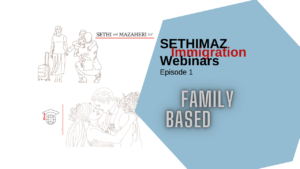[lmt-post-modified-info]
Dear Valued Client,
As we continue to adapt to the coronavirus outbreak, we want to assure you that our firm is fully operational and handling all of our clients’ immigration matters expeditiously. To ensure the safety of our employees and do our part in limiting the spread of COVID-19, our firm will be operating remotely until further notice. Fortunately, we are well-prepared for this scenario and business is continuing as normal. We are available by phone and email, as well as through the MyCase platform. Although face-to-face meetings have been canceled for your safety and ours, we are ready to assist you with any challenges you are facing or questions you have in regards to your immigration matters through our new video conferencing platform.
We realize each client, business, and industry will feel the effects in different ways, and our attorneys are prepared to help you navigate this situation. Our thoughts are with everyone impacted by this pandemic, and we wish for everyone to remain healthy and safe during these challenging times. We are all in this together, and we will get through it together.
Should you or someone you know have specific questions regarding the impact of COVID-19 on their immigration status, please do not hesitate to contact our office directly at (646) 405-9846.
To better understand how these government policies and changes impact the SethiMaz community, we compiled the following answers to your frequently asked questions.
Frequently Asked Questions (FAQ)
How does the coronavirus travel restriction apply to foreign nationals?
Foreign nationals who have visited one of these countries in the past 14 days may not enter the United States:
– China; Iran; European Schengen area (Austria, Belgium, Czech Republic, Denmark, Estonia, Finland, France, Germany, Greece, Hungary, Iceland, Italy, Latvia, Liechtenstein, Lithuania, Luxembourg, Malta, Netherlands, Norway, Poland, Portugal, Slovakia, Slovenia, Spain, Sweden, Switzerland, Monaco, San Marino, Vatican City);
– United Kingdom (England, Scotland, Wales, Northern Ireland); Republic of Ireland.
U.S. citizens, lawful permanent residents, and their immediate family members are some of the general exceptions to these travel restrictions. Please visit the Department of State website for the full list of exceptions
If I am exempt from the travel restriction and able to travel to the U.S., must I enter at a specific airport?
Yes, a traveler who is eligible to enter the U.S. will be redirected to one of 13 specific airports throughout the United States for enhanced entry screening.
Please visit the DHS website for specific information on which airports will receive travelers from the affected countries.
Can undocumented immigrants get tested for the coronavirus?
President Trump announced that undocumented immigrants can get tested for coronavirus without fear of deportation. If you are experiencing any symptoms, please do not hesitate in seeking medical attention in accordance with the CDC guidelines.
How is Public Charge affected by COVID-19 and can I receive public benefits?
USCIS has indicated that medical benefits received for testing, treatment, or preventative measures related to COVID-19 will not be considered as part of the public charge rule. Testing for the virus is admissible and encouraged. Individuals who receive other public benefits, such as unemployment benefits, as a result of the impact of social distancing or self-quarantine measures will have the opportunity to provide an explanation and evidence in support of their case, though it may impact their eligibility for certain immigration statuses.
What happens if I have an existing appointment with the USCIS?
USCIS has closed their offices to the public and cancelled all in-person appointments, including interviews, biometrics appointments, oath ceremonies and in-person RFE responses, until at least April 7th. Most USCIS appointments will be automatically rescheduled while other appointments, such as InfoPass appointments, must be rescheduled directly with USCIS through their contact center. If you have an appointment that is subject to this cancellation, you will receive a notice in the mail regarding the necessary next steps. Emergency services may be provided on a limited basis.
How long will it take for my case to be processed?
Due to increased demand and online traffic, USCIS processing times may be slower than usual. USCIS has not indicated how COVID-19 will impact their remote operations, so we ask for your patience during this transition as cases may take longer to process than anticipated.
Is premium processing still available?
USCIS has announced a temporary suspension of premium processing service. If your application was accepted under premium processing and no agency action is received within the 15 calendar day period, a refund will automatically be issued.
If I have an upcoming appointment and I’m feeling sick, do I have to go?
Your health and safety is of the utmost importance and should be your first priority during this time. If you are feeling unwell or have any coronavirus symptoms, we encourage you to cancel your appointment and reschedule for a later date when you may be feeling better. There is currently no penalty to postponing USCIS appointments due to illness.
I’m in the U.S. on a temporary visa and was laid off. What do I do?
It is important to attempt maintaining employment status for as long as possible, and the USCIS will assist in this venture. Should a worker on a temporary visa fall “out of status,” however, they will be required to file an extension in a timely manner, apply to change their status as soon as possible, or leave the country.
Are employers required to pay H-1B or O-1 employees when the employees are unable to perform their job duties due to an emergency, such as a quarantine?
DHS and DOL have yet to issue any specific guidance regarding this issue. We will continue to monitor the situation and let you know immediately if the government provides any relevant updates.
For planning purposes, based on the regulations, the employer would most likely have to continue to pay H-1B workers in the event of a quarantine, etc. Please the DOL website for more specific guidelines.
I am an international student, how does the COVID-19 situation affect me?
Immigration and Customs Enforcement (ICE) said in a recent statement that “It is important that F and M students maintain their nonimmigrant student status, even during emergency events.” ICE directed students to “work with employers to maintain practical training agreements” and noted that they intended to be flexible during the current academic year regarding students’ active status, recognizing that “the COVID-19 crisis is fluid and rapidly changing”. Please visit ICE FAQs for more information.
I’m on a nonimmigrant work visa and lost my job, what now?
Employees with temporary work visas (O, H-1, L, etc.) could find themselves “out of status” if their company shuts down, their concerts canceled, or they are no longer working and they are laid off. If a foreign national is out of status, the individual must change to another status or leave the country. As of now, there is no clear instruction as to how the government will handle these situations if they arise out of COVID-19 Pandemic closures.
Maintaining legal status includes the timely submission of an application or petition requesting an extension of status before it expires. If the extension request is untimely filed, perhaps for reasons related to COVID-19, the employer or worker should explain why the restoration of status ought still to be granted based on extraordinary circumstances, or why a lapse in status should not deprive the individual of eligibility for adjustment of status to receive a green card under the forgiveness clauses.
Guest workers who remain in the U.S. after their status expires face a minimum three-year “unlawful presence” bar to reentry for overstay periods of less than 12 months, or 10 years for overstays of a year or more.
While USCIS has the authority to suspend the accrual of unlawful presence, its current policy does not clearly provide that relief for untimely-filed requests for extension of status.
I entered ESTA and my time is running out. What should I do?
Normally when someone enters the visa waiver program (ESTA), they cannot extend the period of time in the U.S. Thankfully, extensions are being granted.
Is an immigrant worker entitled to unemployment insurance?
Yes, but the worker generally must have been authorized to work both at the time of their prior earnings and when applying for benefits.
Could I apply for unemployment benefits due to the Coronavirus outbreak?
Please note that every state has its own requirements you will have to meet to qualify for unemployment benefits. However, the general rule is that a person applying for unemployment benefits must be “able and available” to work at the time he/she is claiming the unemployment benefits. This means, that you have to be legally authorized to work in the U.S. at the time you are applying for the unemployment benefits.
If you are currently in the U.S. on an E-2 employee visa, you are only authorized to work for the specific E-2 company, and you cannot work for any other employer. Therefore, you would not be able to prove that you are available to work in the U.S. as your visa authorizes you to only work for the one E-2 company and you are not available to accept any employment in the U.S. Therefore if you become unemployed, you would not be able to prove that you are able and available to work in the U.S. and could not collect unemployment benefits.
My spouse applied for unemployment benefits. Will the government determine that he/she is likely to become a public charge?
Given the new public charge rule which went into effect on February 24, 2020, many clients are concerned that applying for unemployment could be seen as a negative factor in a public charge analysis. Under the new law, unemployment benefits were specifically excluded from the public charge rule and are not one of the benefits considered under the public charge rule. However, if you decide to apply for a non-immigrant visa in the future, the Consular Officer could perhaps take the fact that you received unemployment benefits into account in his/her totality of the circumstances analysis. Click here for more information.
What if I lose my job during the Coronavirus crisis?
During this economic crisis, it is probable that many will lose jobs. Many visas allow for a grace period if employment stops and you have a valid I-94.
There is also an option to file for a change to a different status (eg. B-2). This is a complicated area and you should contact an immigration professional if you are in this situation. You can find out more about grace periods by clicking here.
Falling Out of Status
Employees with temporary work visas (O, H-1, L, etc.) could find themselves “out of status” if their company shuts down, their concerts canceled, or they are no longer working and they are laid off. If a foreign national is out of status, the individual must change to another status or leave the country. As of now, there is no clear instruction as to how the government will handle these situations if they arise out of COVID-19 Pandemic closures.
Maintaining legal status includes the timely submission of an application or petition requesting an extension of status before it expires. If the extension request is untimely filed, perhaps for reasons related to COVID-19, the employer or worker should explain why the restoration of status ought still to be granted based on extraordinary circumstances, or why a lapse in status should not deprive the individual of eligibility for adjustment of status to receive a green card under the forgiveness clauses.
Guest workers who remain in the U.S. after their status expires face a minimum three-year “unlawful presence” bar to reentry for overstay periods of less than 12 months, or 10 years for overstays of a year or more.
While USCIS has the authority to suspend the accrual of unlawful presence, its current policy does not clearly provide that relief for untimely-filed requests for extension of status.
Please note the following regarding Government operations during this time:
- USCIS is still receiving applications and will accept scanned copies of signatures for all applications.
- Premium processing is not currently available for any I-129 or I-140 petitions
- At present, the U.S. government has not announced any shift in filing deadlines or requirements that relate to immigration, with a limited exception for the Visa Waiver Program (ESTA).
- ESTA exceptions are being granted so please contact us if you require additional information.
- While filing deadlines have not yet been extended, there are often options that involve extending or changing status that could apply in your case. Please reach out to us and we can explore these options.
- Many consulates have suspended routine visa processing services and are canceling appointments.
- Some immigration courts have closed and USCIS has eliminated almost all in-person meetings. (eg. biometrics, interviews, etc.)
- Many borders across the globe are closing and this is expected to continue. It is very likely that the U.S. will also completely close the border until this situation shows improvement.
- You should expect delays in processing across the board.
For the latest information about the novel coronavirus itself and general travel precautions, visit:
- The World Health Organization
- European Commission’s Directorate for Health and Food Safety (DG SANTE)
- United States Centers for Disease Control
Please stay safe!





 by Prozco®
by Prozco®